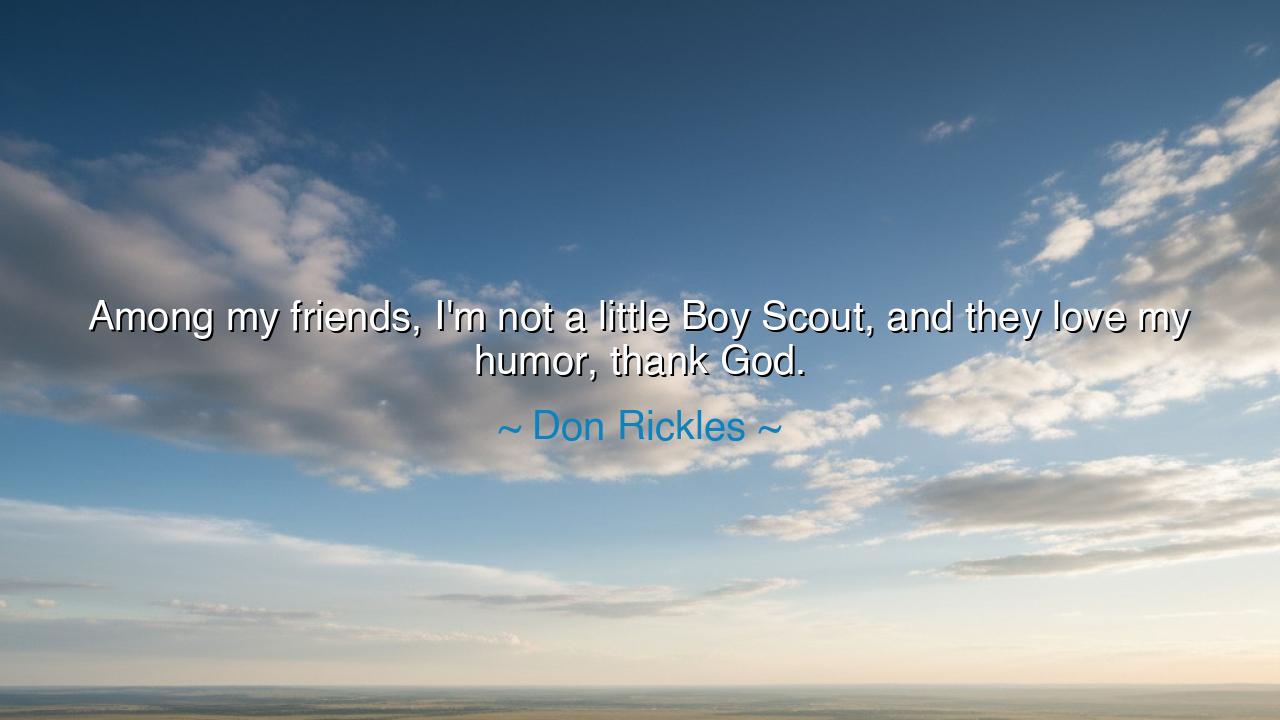
Among my friends, I'm not a little Boy Scout, and they love my






When Don Rickles said, “Among my friends, I’m not a little Boy Scout, and they love my humor, thank God,” he spoke with the voice of a man who understood the sacred balance between honesty and affection. In these few words lies the essence of his comedic spirit—a soul that wielded truth as a sword, but laughter as the balm that followed the cut. He was reminding the world that humor, when born from genuine friendship, is not cruelty, but intimacy; not mockery, but trust. For among true companions, laughter becomes a language of love—a way of saying, I know you, I see you, and I accept you as you are.
The origin of this reflection lies in Rickles’s own legacy as one of comedy’s great jesters. Known as “The Merchant of Venom,” he built his art on quick wit, biting remarks, and fearless honesty. Yet beneath the sharpness of his words, there was always warmth. His humor thrived not in malice, but in camaraderie. When he said he was “not a little Boy Scout,” he meant that he did not sugarcoat life; he did not play the saint. His humor was raw, unfiltered, imperfect—yet it came from the heart. And those who truly knew him loved him not despite this honesty, but because of it. For Rickles, laughter was truth wrapped in audacity, and friendship was the sanctuary where that truth could safely live.
To say, “they love my humor, thank God,” is to acknowledge the fragile miracle of connection. Humor is a double-edged gift—it can divide as easily as it can unite. But among friends, it becomes something higher: a celebration of difference, a way to release tension and draw people closer. Rickles’s humor, though bold, was never detached from compassion. He mocked everyone—kings, celebrities, and common men alike—not to demean them, but to remind them that no one is above laughter. It was his way of restoring equality in a world obsessed with ego. The wise saw this for what it was: a sacred act of leveling the playing field through joy.
Throughout history, those who have dared to speak truth through laughter have walked a similar path. The court jesters of the ancient world understood this power well. In the courts of kings, where flattery reigned and fear silenced tongues, only the jester could tell the truth. Cloaked in absurdity, he mocked the mighty and survived. Why? Because his ridicule was bound by love for humanity. He reminded rulers of their mortality, stripped arrogance of its illusion, and made the powerful human again. Don Rickles was a modern echo of that tradition—a man who dared to jest so that others might remember how to laugh at themselves.
But there is a deeper wisdom hidden in Rickles’s words: the understanding that humor reveals character. To laugh with others, not at them; to find joy even in one’s own flaws; to speak boldly without hatred—these are signs of inner freedom. The one who fears offense more than falsehood becomes a prisoner of politeness; the one who can laugh at truth becomes a master of the self. Rickles’s life teaches us that humor, when wielded with heart, is not destruction—it is revelation. It uncovers what pride conceals and heals what shame divides. In this way, his “not being a Boy Scout” was not rebellion—it was authenticity.
There is also courage in his statement. For to be humorous in a serious world is to risk misunderstanding, to stand against the tide of caution and fear. Rickles faced this courageously, trusting that his friends—and his audiences—would hear the love behind his words. He believed, as the ancients did, that laughter and truth must walk hand in hand. “They love my humor,” he said with gratitude, not pride, for he knew that love was what made the laughter safe. His gratitude—“thank God”—is the voice of a man who knows that connection through laughter is a divine gift, one not earned but bestowed through grace and honesty.
So, my children of laughter and light, take this wisdom into your hearts: be bold, but be kind. Let your humor spring from truth, but never from cruelty. Among your friends, dare to be yourself—not a perfect saint, not a “little Boy Scout,” but a living, breathing soul who can laugh, stumble, and still love. When you speak, let your laughter carry warmth; when you jest, let it build bridges, not walls. For laughter that wounds divides, but laughter that heals unites. And remember, as Don Rickles taught the world, that humor is not an escape from truth—it is the truth’s gentlest voice.
And thus, let this be your lasting lesson: to laugh is holy, and to make others laugh is divine. For laughter is the sound of hearts recognizing one another, and humor—when born of love—is the proof that even in imperfection, we can find grace. Be thankful, then, for the friends who “love your humor,” for they see in it not offense, but affection; not mockery, but meaning. And may your words, like Rickles’s, shine with that same fearless kindness—the kind that pierces pride, awakens joy, and reminds the world that love, when wrapped in laughter, never dies.






AAdministratorAdministrator
Welcome, honored guests. Please leave a comment, we will respond soon